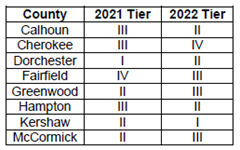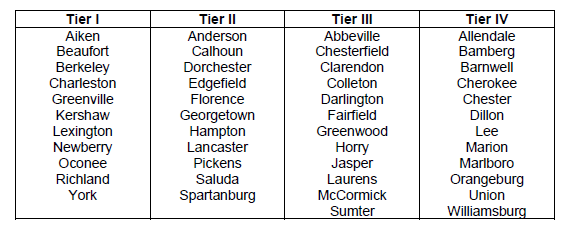HSB Economic Development Update – January 2022

2022 County Tiers Set for JTCs, Fee in Lieu and Tax Moratorium
 Each year, South Carolina's 46 counties are designated as being within one of four "tiers" for job tax credit and job development credit purposes based on a county's unemployment rate and per capita income. The SC Department of Revenue has published the 2022 designations. The chart to the right shows the counties with a new tier designation.
Each year, South Carolina's 46 counties are designated as being within one of four "tiers" for job tax credit and job development credit purposes based on a county's unemployment rate and per capita income. The SC Department of Revenue has published the 2022 designations. The chart to the right shows the counties with a new tier designation.
Below is a complete list of counties and their respective tiers for 2022:

There was no change in the income tax moratorium counties (Chesterfield, Dillon, and Jasper), and for 2022, no counties qualify for the reduced $1 million investment threshold for FILOT agreements.
2022 JDC Wage Update Released
On January 13, 2022, the South Carolina Coordinating Council for Economic Development issued an updated hourly wage memorandum for companies participating in the job development credit (JDC) program. The updated wage levels and associated JDC percentages are as follows:
2% - $10.84 - $14.44 / hour
3% - $14.45 - $18.05 / hour
4% - $18.06 - $27.09 / hour
5% - $27.10 and over
Job development credits are always subject to the terms of a company’s “Final Revitalization Agreement” with the Coordinating Council. Credits are the product of wages paid to eligible employees, a percentage ranging from 2% to 5% (as set forth above), and a percentage based on the county’s tier ranking, ranging from 55% for projects in Tier I counties to 100% for projects in Tier IV counties. Most Final Revitalization Agreements also contain a contractual minimum wage level, and agreements in recent years provide for that wage level to be reset every five years based on an inflationary adjustment. Companies claiming JDCs should pay close attention to these issues.
Each company participating in the JDC program should receive an updated wage memorandum and contact sheet that must be signed and returned to the Coordinating Council by April 30.
Port Volume Cargo Credit
South Carolina Code § 12-6-3375 provides a tax credit to a taxpayer engaged in manufacturing, warehousing, or distribution that uses South Carolina port facilities and increases its port cargo volume at these facilities by at least 15% in a calendar year over its base year port cargo volume. Form TC-30, "Port Cargo Volume Increase," is used to claim the credit.
It is important to note that tax credit applications should be submitted early in the year as the maximum amount that all taxpayers may claim pursuant to this section is subject to an annual cap. Please contact a member of the HSB ED team if you have questions.
Agricultural Tax Credit
In 2018, South Carolina introduced a new program that provides a tax credit to agribusiness or agricultural packaging operations increasing their purchases of South Carolina agricultural products. If the "base year" of a company's purchases exceeded $100,000, and the company increased such purchases by at least 15%, the company can submit an application for credits against either income or withholding taxes. The amount of the credits is determined by the South Carolina Coordinating Council, based on the information provided in the application. The credit may not exceed $100,000 per taxpayer in any one year. As with port cargo volume credits, these credits are also subject to an annual, statewide cap, so qualifying taxpayers should apply for credits as early in the year as possible.
Per Capita Income Figures
On December 10, 2021, the South Carolina Department of Revenue released SC Information Letter #21-27, setting forth the updated per capita income level for the state at $48,021. Please access the link to view the county per capita income levels. The state per capita income is relevant for the small business job tax credit, in which a taxpayer with 99 or fewer employees in an eligible industry increases employment by two or more new, full-time jobs. If the average wages of those jobs do not exceed 120% of the lower of the county or state average per capita income, the credits are cut in half. Notably, if the small business creates ten or more new, full-time jobs, the business qualifies for the full amount of job tax credits without regard to wages.
In addition, the state per capita income is relevant for purposes of defining a "qualifying service-related facility," which is applicable for both job tax credits and job development credits and which has become an increasingly important avenue for non-manufacturing businesses to qualify for key South Carolina incentives. Further, the figure is relevant to technology-intensive facilities for determining eligibility for the sales and use tax exemption for computer equipment, as well as for the state income tax credit on personal property expenditures associated with corporate headquarters projects.

